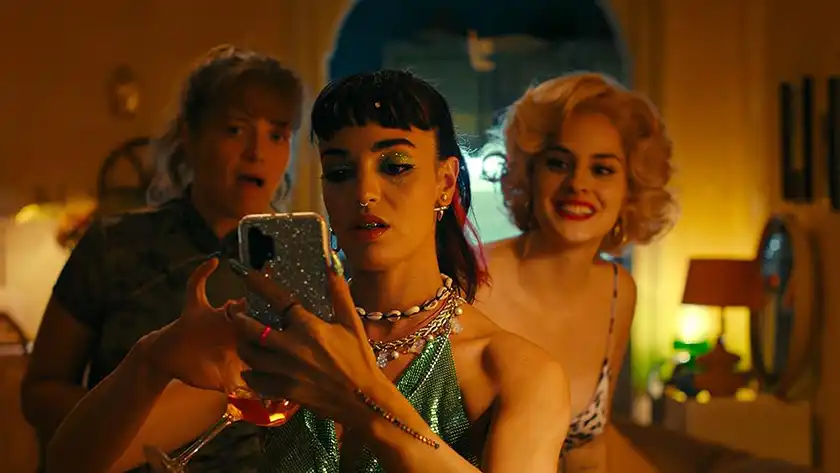Gory, bold, and hilariously funny, The Balconettes is the horror comedy of the year, with a beautiful feminist twist to it.
Director: Noémie Merlant
Writers: Noémie Merlant & Céline Sciamma
Genre: Horror, Comedy
Run Time: 104′
BFI London Film Festival Screening: October 15-19, 2024
U.S. Release Date: TBA
U.K. Release Date: TBA
“We can only be ourselves with ourselves,” says one of the characters in The Balconettes (Les Femmes au balcon) after being reunited with her friends. Noémie Merlant’s sophomore feature immediately intrigued me as a feminist horror comedy which promised to tackle themes of abuse and revenge in a new and interesting way. The film is ultimately an ode to female friendship which unites the three main characters and allows them to survive everything that life throws at them.
Set in Marseille, The Balconettes follows two roommates, the titular balconettes: Ruby (Souheila Yacoub, of Dune Part 2), a sex-positive camgirl, and Nicole (Sandra Codreanu), a shy writer who is working on her first novel. At the beginning of the film, they are joined by their friend Élise (Noémie Merlant, of Portrait of Lady on Fire), an actress who is desperate to spend some time with her friends rather than go home in Paris to her clingy husband Paul (Christophe Montenez).
During a heatwave that has them staying predominantly indoors, either in their apartment or on their balcony, all three find themselves staring and fantasising about their new mysterious neighbour Magnani (Lucas Bravo) who lives opposite them. But not everything is as it seems and their life suddenly takes a new turn when the three friends have to deal with disposing of the body of an abuser. At the same time, his ghost continues to haunt Nicole throughout The Balconettes while all of them try to cope with what happened in their own way.
From the very opening scene, The Balconettes sets its themes and tone immediately with a pan that moves through all the balconies to find a woman killing her abusive husband: it is as funny and rewarding to see her get her revenge as it is horrifying to see every gory detail of this murder. The balance between horror and comedy is not easy to achieve, but Merlant and co-writer Céline Sciamma do so brilliantly by alternating very tense and scary scenes – heightened by Uèle Lamore’s ominous musical score – with satirical and funny moments, sometimes even in the same sequence.

The film also never overexplains things to us: we might not know much about the lives of the three friends up until now, but that does not seem to matter. Their friendship and respective characters are so clearly established from the very first time they appear on screen, that I never really felt like I needed to know anything more than what the film tells us about their story at the present moment. Overall, the writing in The Balconettes is particularly excellent, especially in the way it approaches such sensitive topics of rape and abuse with a very honest but also mature approach that avoids turning this traumatic experience into a plot point or making a spectacle out of it.
It is incredibly refreshing to see a movie take such a real approach to portraying some very real horrors that women go through every day with disarming honesty. There is nothing that The Balconettes is afraid to explore when it comes to its themes, touching on very current and sensitive topics, such as sexual abuse and sex positivity, which makes it both a necessary and bold film in today’s world. It also gives the audience a sense of poetic justice in a world that does not look so dissimilar from our own but it is one in which abusers and rapists receive a punishment worthy of their crimes.
In a genre that has traditionally shown women’s pain quite graphically through their disembowelled bodies, this film feels like a breath of fresh air where the so-called victim of the murder is, instead, a man. The way Merlant and Sciamma deal with showing violence on screen in The Balconettes is exceptional, as they are very careful about what the audience sees and what is, on the contrary, left for us to understand. This sensibility translates in the visuals of the film as well and, more specifically, in the way naked bodies are portrayed on the screen.
While the female characters seem to maintain a sense of authority and control over how their body is presented on screen, the dead men are instead the ones who are left to serve as a spectacle for the viewers. This also reverses this overused trope in the genre while also delivering a sense of justice as it becomes increasingly clear that the man who is killed was never really the victim at all. It is also interesting to see how the genre of horror films as a whole seems to be going in a feminist direction with this year’s films in particular. The Balconettes is another excellent addition to this subgenre that I hope to see become more and more prominent in the near future.
Ultimately, The Balconettes is a brave and bold film that does not seem to worry about what is proper or appropriate to show on the big screen but, rather, focuses on getting its message across in any possible way. In a world where we constantly see violence against women being perpetrated over and over again, Merlant’s film very much feels like a liberating scream against such injustice that often goes unpunished. Ultimately, the movie also feels quite cathartic in the way both the murder and the eerie and supernatural elements are solved at the end of the story.
The Balconettes was screened at the BFI London Film Festival on October 15-19, 2024.

